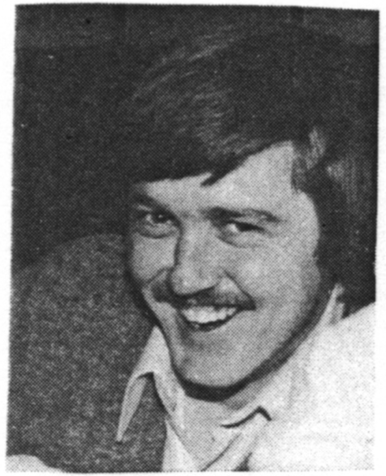Daniel Polk Smith – Grandson of Ed and Minnie Beaver
On a cold day about 46 years ago, the author of this book was in no condition to be planning any literary endeavor. She was about to become a mother for the second time. I was born on February 21, 1940 in the little West Texas town of Spur. My parents, John and Lois Smith, were living at Girard, Texas where Dad was the principal of Girard High School. My brother, Robert Don, was a little over two years old.
Few memories come to mind of my early years. I have vague recollections of certain incidents before the age of five. However, I am not sure if these are genuine memories or recalls of stories my parents have repeated over the years. I remember living in a number of different towns and cities. My dad quit teaching school and began working for the Army Corps of Engineers in 1941 and was transferred frequently. Such places as Girard, Victoria, Midland, Brownsville, and New Orleans, were a part of my early life. I recall little things near the end of World War II. Everyone dressed their children in Army and Navy togs. Patriotism abounded. My brother and I had matching Army uniforms, and we felt very proud. We played with little guns, pretending to shoot the “evil Japs and Germans.” That was an acceptable form of child’s play during the war.
In January of 1944 Dad was transferred to New Orleans as a loaned employee from the Galveston District. Mother, Bob, and I went to Girard to stay with Pa and Granny until Dad could find an apartment for us in New Orleans. I was 5 years old, and Bob was 7. I remember a joke I pulled on Pa one day. He had an old sick hen cooped up so he could doctor her. She died anyway, and he told me to come with him to bury her. He dug a hole out behind the garage, put the hen in it, and covered her well. Later on that day, I slipped out and dug the old hen up, dragged her back and put her in the coop. When Pa discovered her back in the coop, he was so amazed and so overcome with laughter that he spread the story all over the community. This is another one of the incidents I remember vaguely, but have heard it retold many times, and it seems to be real in my mind.
After the war ended in 1945, and I was five years old, we moved to Port Lavaca, Texas, a small coastal town of about 5,000 population. Dad was transferred back to the Galveston District of the Corps of Engineers with his office at Port Lavaca. Everyone was trying to get back to normalcy, and those were good times for my family. Mother and Dad had many friends in the church and the community, and there were lots of family activities. On reflection, it seemed to be the ideal environment in which to grow up.
Many pleasant and exciting memories come to mind of events, places, and faces in Port Lavaca. Among them: Dad shooting our rabid cat in the back yard; wading in knee deep water in our yard after a heavy rain; getting our first dog, “Shep”; my first day at school; my mother as my first grade teacher; my comical little friend named ’’Dinks” Boyd; gigging flounder by lantern light in the Lavaca Bay; those awful piano lessons; Bob’s first paper route; and on and on.
Perhaps the most vivid of all my childhood memories are times we shared with our relatives. My parents both came from very large families with extremely close bonds. In fact, the aunts, uncles, first cousins, and second cousins are almost too numerous to count, We spent most of our holidays and vacations with the families. The excitement of traveling to see our grandparents, the camaraderie with the kin, the hugs and kisses, and the love we shared are an integral part of my being.
I don’t remember as much about my grandfather Beaver, Pa, as we called him, as I do about Granny who lived with us, off and on, during my teen years. I was between nine and ten years old when Pa died, but I have an image of an old man, bald, with only one eye, carrying a cane, who seemed to always be smiling and jolly.
Pa’s funeral was the first one I ever attended, and it was a strange experience for a nine-year-old. I remember lots of people in and out of the house bringing food. His body lay in repose at their house for friends and family to view. I sensed feelings of joy among the relatives who had not seen each other for a while, and at the same time sadness at the loss of our patriarch. It was confusing to me at the time. I later came to understand that among close families both joy and sorrow are shared on occasion.
There is really only one unpleasant memory of these times—my deteriorating asthmatic condition. I was diagnosed as being asthmatic at a very early age, and living on the Gulf of Mexico did not seem to be the ideal place for me. I was missing school frequently, and my activities were more and more limited. The doctor advised us that a high, dry environment would be the only solution. So, my parents made the difficult decision to leave the coastal area and move to the arid southwest. In the summer of 1949, Mother and I went ahead to Abilene, Texas where we stayed nearly two months with her brother, Clay, and wife Bernice and sons. Dad and Bob stayed in Port Lavaca to finish work and make arrangements to move; then they came for us, and the family headed toward New Mexico. Albuquerque was going to be a mere “stop in the road” for us. It became my home for the next 16 years.
My grade school years in Albuquerque were exciting times. My asthmatic condition seem to be improving, and I was able to enjoy more physical activity. We lived in a little stucco house on Vassar Drive, and although it was a modest abode, managed quite well. It took a while, but as a roots grew deeper we begin to call Albuquerque our home. My parents still live there.
Bob and I were always in different schools because he was three grades ahead of me, as he had been allowed to skip the fifth grade, When I was in grade school he was in Junior High, and by the time I got to High School he had already graduated. I think that during our school years we might have been closer had this not been the case. Bob was an outstanding academician, who always made excellent grades. I always felt a sense of pride about that, but man, was it a hard act to follow! I was always interested in school, but mostly from a social point of view. I was a restless type in class, who would rather be outside playing, and as a result, managed to hang on to a “slightly above average” grade level.
By the time I got to High School Bob was married, had one child and was attending the University of New Mexico. He was the recipient of the highest scholarship awarded at UNM, which he continued to receive through graduation. My High School days were filled with fun and mischief, and I continued to be one of those slightly above average students while working part time. I ran with a “not so scholarly” crowd who shared the same objective—to have a good time and let the rest of the world go by. I did okay in Biology, Chemistry, and Math—not so good in History and English. I was interested in drama, and had a part in two plays at High School and one at a local Little Theatre.
Graduation from High School was a sobering experience for me because it meant that I would have to make some decisions of what I was going to do when I “grew up”. It had always seemed to be an accepted thing in our family that we would go to college. I was not pushed to go—no demands—but there was an underlying feeling that my education was not to stop with High School. In the fall of 1953 I enrolled in Lubbock Christian College. I was not too happy to leave Albuquerque, since many of my friends were enrolling in the University of New Mexico. I liked the college, but unfortunately, it was not a good area for an asthmatic, and I was forced to drop out and return home. That spring I entered UNM.
My experiences at the University are perhaps the most important and memorable times of my life, although my grades did not always reflect it. I was learning more than I ever had, and a new world seemed to be opening up to me. I was like a dry sponge, soaking up thoughts and ideas about life that I had never contemplated before. I took Biology, Anthropology, Math, Philosophy, and quite a liberal array of other courses. The social life was good, too. I pledged a fraternity, and we always had some social events going. I became interested in gymnastics and became fairly proficient in high bar, parallel bar, and trampoline. A friend, David David, and I had a trampoline act which involved serious and clown stunts, both single and double routines. We performed at UNM football and basketball half times, and eventually became known as a couple of dare devils, because we enjoyed pulling some shocking stunt to amaze the crowd. A handstand on the edge of a roof was always good for a gasp, as were various tricks on David’s motor scooter. Now, I sometimes cringe at the thought of those crazy things we did.
During my junior year I met a girl named Sheila DeWitt, who was an entering freshman. We immediately became attached to each other, started dating, and became close to each other. She soon began to talk of possible marriage, and as things progressed we became engaged and set the date, with plans that she would work while I finished college. I was somewhat reticent about the whole thing because I wasn’t sure that I was mature or responsible enough for marriage. We were married in June of 1962, a big wedding with all the trimmings. In little over six months Sheila filed and obtained a quick divorce. It was the fault of neither, really. We were just a couple of kids who should have been interested in growing up first.
I dropped out of school the semester of the divorce, feeling like a failure, and not wanting to finish my courses. I took a job with a friend selling books door to door. We went all over the State of New Mexico; one trip was Portales. We took a tour of the campus of Eastern New Mexico University. I was impressed and thought it might be a good place to finish my college work in a different setting. My parents agreed to help finance it, so I enrolled in ENMU in the spring of 1963. Being away from home helped me to mature, and for the first time I felt self-reliant and totally responsible to myself. In the spring of 1964 I graduated with a B.S. degree in Education with a major in Biology. Before graduation I signed a teaching contract with the Roswell High School for the fall of 1964.
After teaching a few months in Roswell I began to miss the pace of the city. Roswell was a typical small town, and very nice, but it lacked the variety of activities a larger town affords. I finished my teaching contract that year, then moved back to Albuquerque. There were no teaching vacancies so I took a temporary job with the Forest Service on a construction and maintenance crew. The work was tough, and something I would not have made a career of. A teaching position opened up just before Christmas, and I was fortunate to get the job. I began teaching Biology at Sandia High School in Albuquerque before the Christmas vacation of 1965. Being back in Albuquerque was enjoyable; I liked my teaching job, and I renewed old acquaintances from High School and College. There were a lot of girlfriends but nothing serious until I met Patricia Anderson. She was a divorcee with 2 small children, Christopher, age 5, and Shannon, age 1. We dated casually, at first, then regularly, and my attachment to her children grew more intense. I realized that taking on the responsibility of an “instant” family was great, but I wanted to marry Pat, so we decided to tie the knot. A quick ceremony by a Justice of Peace in Taos, New Mexico was all it took.
I soon realized that the salary of a school teacher was insufficient to comfortably support a family of four, and I began considering changing careers. My background of training didn’t exactly qualify me for a business related job. One of my friends who was working for Prentice Hall Publishing Company arranged for an interview for me with his management. I was accepted and offered a job as a Library Sales Representative. After a short training period in New York, I was given the Kansas-Oklahoma territory.
So, here we were, packing our belongings, saying goodbye to our parents and friends, and heading for Wichita, Kansas, a place as foreign to us as Timbucktu. It was an exciting, but scary experience to be moving to a place where we knew no one. Wichita became the first of several moves we made before coming to Tucson.
Neither Pat nor I could adjust to the constant travel required to cover my sales territory. It seemed that I was never home, and that was hard on us, being newly married and living in a strange town. I decided to inquire about a job with Boeing in Wichita Falls. A position in their Estimating and Forecasting Department was offered me. Here, again I changed jobs. After six months with Boeing, their work began to slow down, and they offered me a temporary assignment in Seattle, Washington, rather than face a possible lay off. In less than one year we were moving again, this time the Northwest, another unknown land to us.
The Seattle area was a far cry from the desert Southwest, or the Midwest. There was forest literally everywhere, and a constant overcast weather condition. The temporary assignment with Boeing lasted one year, followed by an offer for a permanent position, which I declined because we didn’t want to make Washington State our permanent home. I was interviewed by a Management Representative from McDonnel Douglas Corp oration who came through Seattle on a hiring campaign. An offer came by telegram for a position with them in St. Louis, Missouri. By this time Pat and I felt we could go any where and adjust to almost anything, so there was no hesitation in deciding to move to St. Louis. The children were too young to be affected by another move.
My job with McDonnell was in the estimating department. I worked on several major cost proposals, including the F-14 and F-15 Aircraft (McDonnell was awarded the F-15 contract after I left). We enjoyed St. Louis, made a lot of friends, and I liked my work. I had not had any serious asthma problems for a while, but I began with it in St. Louis. One attack landed me in the hospital for several days. It became apparent that I would be healthier in another climate. I updated my resume and began scouting for job possibilities back in the southwest.
As luck would have it, Hughes Aircraft Company in Tucson, Arizona flew me out there for an interview and offered me a job the same day. Here we go again, after almost 2 years, packing up to move to a totally foreign place. It was hard to leave the roots we had established in St. Louis, but we knew from the start that we would like Tucson. It had mountains, desert, and fresh air. I felt deep down that Tucson might become our permanent home, and it has been for 16 years.
We bought a home, and for the first time in our marriage, began to act like permanent residents. The first couple of years were good. The kids liked the neighborhood and school; I was doing well with my work, and Pat appeared to be happy, though there seemed to be a growing distance between us. She had enrolled in the University of Arizona on a part time basis and was extremely busy. We were having differences over finances, the children, and other things. The adventures of living in many different cities during our early years of marriage were exciting, but now our sense of permanency in Tucson seemed to cast a negative shadow over our relationship. Pat seemed more concerned with her economics courses and her new circle of friends at the University than she did with me and the children. The situation seemed hopeless and irreversible. We were divorced in late 1975 after 10 years of marriage.
There I was a single man again at 35 years of age. The divorce had a devastating effect on me, and I was not able to function normally for a long time. I finally accepted things as they were and began to acquire a new circle of friends, many of whom were trying to overcome similar experiences. We never looked back on the unpleasant memories. I began to enjoy the single life again and took advantage of all the free time I had. There were lots of activities, such as parties, trips to Mexico, California, and the like. I continued to do well at Hughes, accepting several promotions. Over the years there were several girlfriends, but none serious enough to form a permanent relationship.
In 1978 Barbara Sweet came to work in my department. She was a young 23-year-old good-looking girl. We got along well at work, and so one day I ask her out to dinner. We enjoyed each other’s company immensely, and soon began dating steadily. We settled into a comfortable relationship, and for the next two years developed a deep and lasting love for each other. We worked carefully in developing our relationship, to understand each other’s character, strength and weaknesses. Barbara was amazingly mature for her age, who understood the importance of building a lasting relationship. We were married September 13, 1980.
As of this writing we have been happily married for a little over five years. There have been a few times that were not so good, but only one serious enough to challenge our re lationship. Thankfully, that one has been resolved. On August the first, 1983 we were blessed with the birth of a 3-pound baby girl we named Cara Janelle. From the moment I cut her umbilical, our lives have been enriched immeasurably. I am looking forward to raising a daughter, but I know the years will pass too fast.
Two years ago, I was promoted to business manager of one of Hughes’ major contracts. Barbara has not worked on a regular basis since the baby was born. We are currently involved in landscaping and furnishing a new house we bought a year ago. Things are good and the future looks bright. Throughout the years there has been one single underlying force which provided a constant source of strength for me—that is my parents. My love for them and their love for me has endured through the years unshaken by any events. They were always very happy for me when times were good, and encouraging and helpful when things were not so good. I was not always there when they needed me, and at times I was selfish and distant to them. There is no way I could return all they have given. I only hope that Barbara and I can pass along that source of strength by providing our children the love and guidance they will need in the years to come.
Best wishes to all aunts, uncles and cousins, wherever you are. It is good to keep in touch.

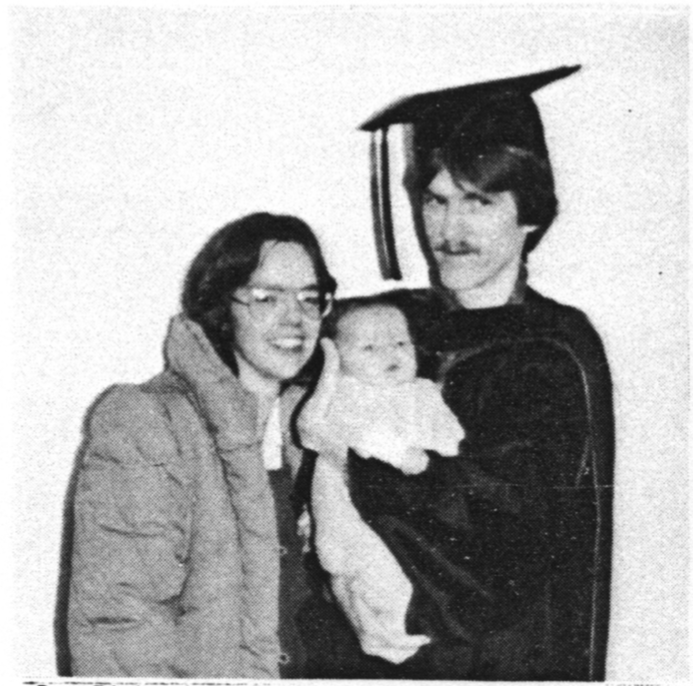
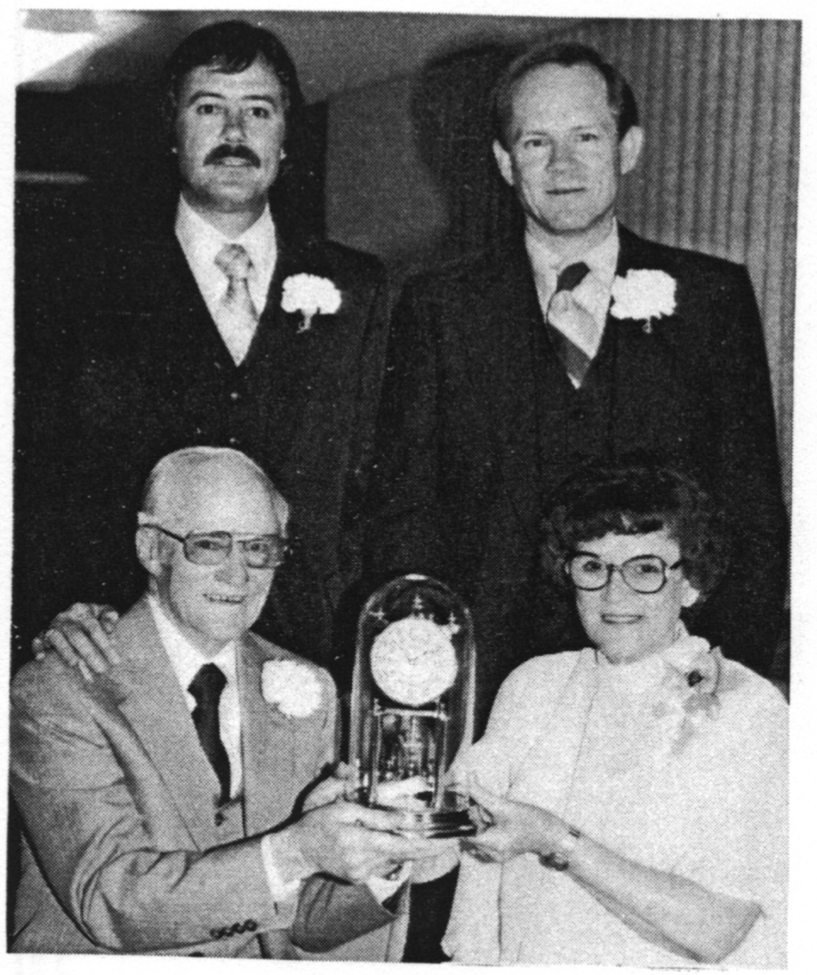
Seated: John and Lois
Sons standing: Dan P. Smith, Robert D. Smith
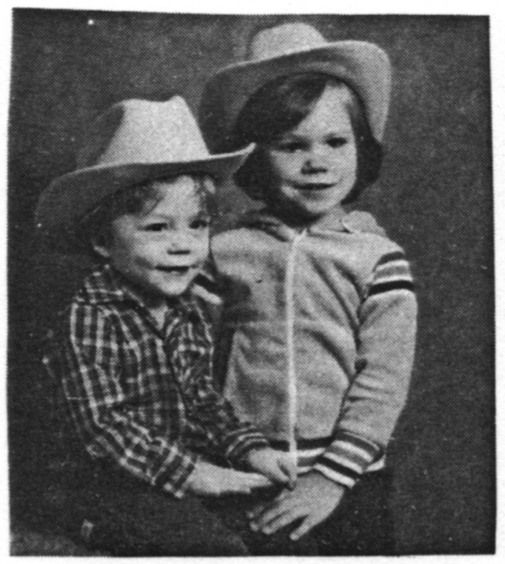
Grandsons of Barbara and Bob Smith
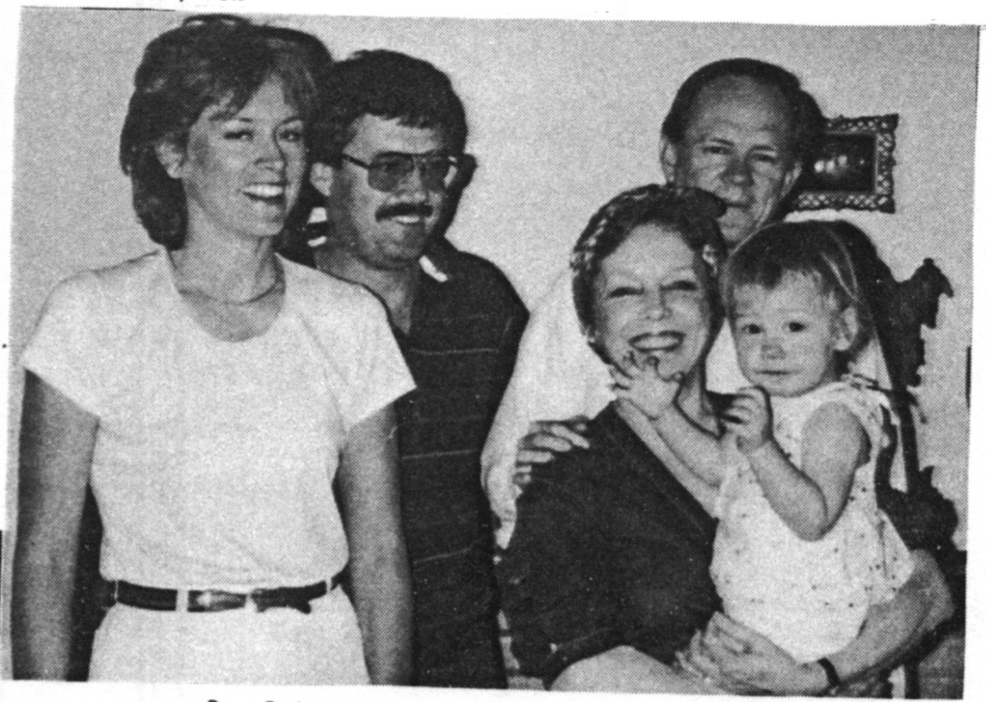
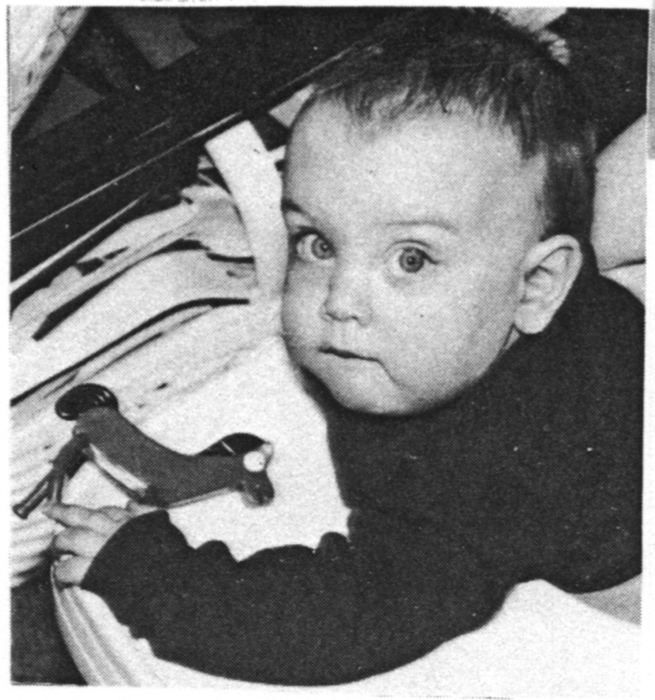
Grandson of Barbara and Bob Smith
